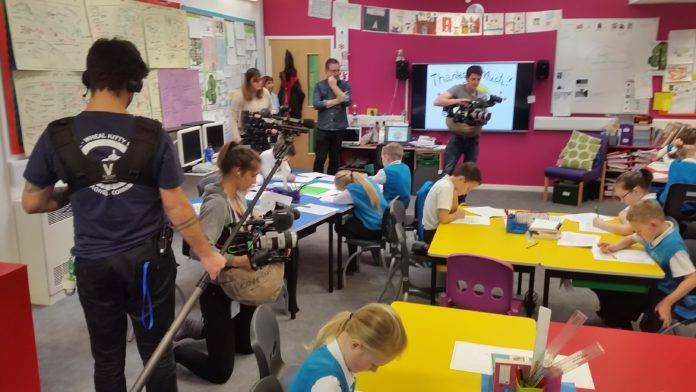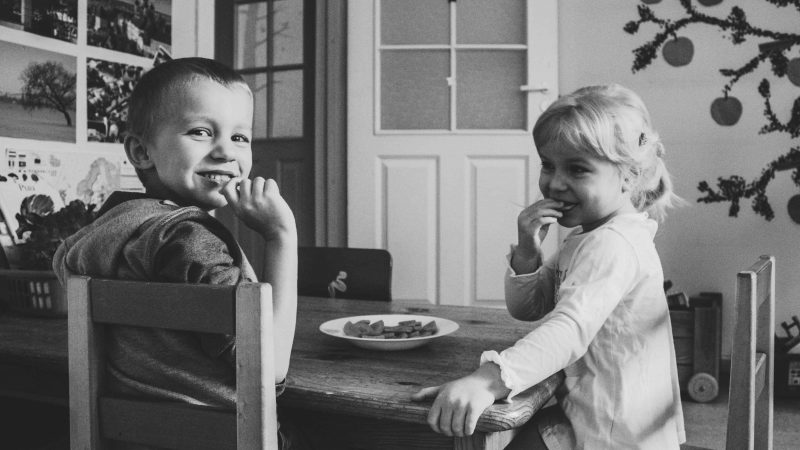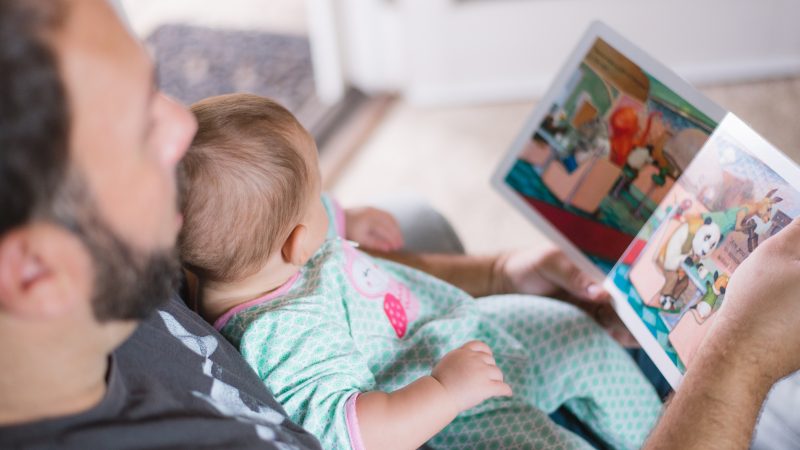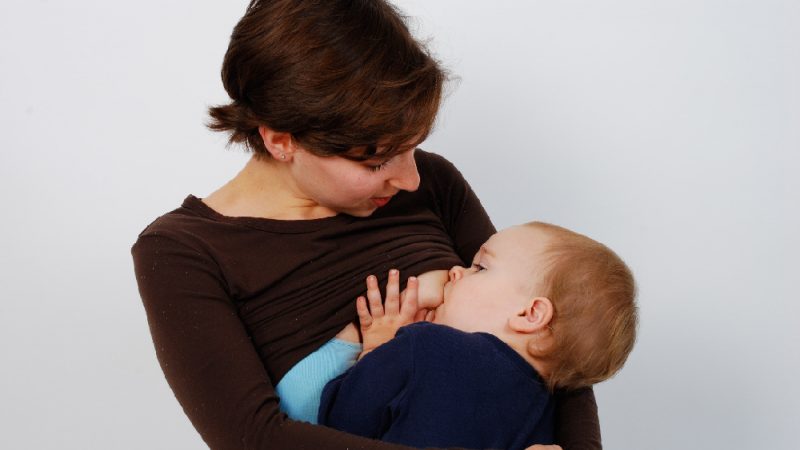
Gender Bias in Schools – a Q&A with Graham Andre of No More Boys & Girls
Welcome Graham Andre of “No More Boys and Girls”!
Graham Andre:
Evening everyone, I am a Year 4 teacher working at Lanesend Primary on the Isle of Wight, this is my 6th year of teaching, before that I was a teaching assistant but my first job was as a nanny I was one of a handful of male nursery nurses…smashing gender stereotypes before I was even aware there was such a thing.
And this time last year my classroom looked a little like this [see pic above] as I was lucky enough to be part of the BBC2 documentary ‘No More Boys and Girls’
Rebecca (PSG): I’m curious to know – what was the experience of taking part in ‘No More Boys and Girls’ like? On TV looked like the kids found it fun – and in that picture it looks like they’re completely used to the cameras being there!
But how was it for you as a teacher? Was it a challenge to take part and still teach your class?
Graham: I think part of the reason that we were chosen was because the children didn’t really take much notice of the cameras and acted very naturally…personally it was the hardest 6 weeks of teaching ever as they were in every day and I was not told what would be happening, this was done so that I would react as the kids did to things that happened and I didn’t have any preconceived ideas about the tasks that were set. So in short t was tiring but really worth it.
PSG B: Did the ideas spread throughout the school after the experiment, and was any resistance if so?
Graham: There was very little resistance, I think people genuinely thought that if it was going to be of a benefit to our children then it was worth doing. There was a little resistance from the press at first but when the documentary aired that seemed to change.
Teachers were also receptive to the changes, we were very proud of the documentary and the impact it had on the children…it’s really about sustaining that impact though.
It has totally changed my way of teaching and I am so passionate about helping to create a gender equal world for our children to grow up in.
Rebecca (PSG): It seemed on the program that the kids really benefited from the change away from gender stereotypes. Was that the reality off screen too? Have you seen any lasting changes?
Graham: What you saw on screen was a very true reflection of what happened, there were some very dramatic changes journeys taken by the children and myself…nothing was scripted. I am with the same class and my girls continue to have great faith in their own abilities and any new children that join the class are swept up in it too…the hardest part has been to get boys to talk about their emotions, many are much better at empathising with others but one or two still struggle…work in progress.
PSG C: How did it go down with their parents and have they changed in any way too?
Graham: The parents enjoyed the experience, they saw it as a very positive thing. Most of them continue to think about things differently, their use of language, the way they treat siblings etc. it has definitely had an impact, plus they Dojo me pictures or articles of things that they have seen in the press linked with stereotypes.
PSG D: Has the school kept all the ideas introduced? Was there anything not kept?
As asked above – have you seen any lasting changes? If so, which students do you feel have benefited most?
Graham: We kept all the ideas, the positive signs are now up in all classroom, gender neutral books are in each class, gender equality and talking about gender is now part of our curriculum, the language we use with our children etc. The girls have really benefited from this, they have grown in confidence and feel they can achieve anything and this is mirrored in their academic achievements. The boys as a whole are more empathetic and don’t tend to overestimate themselves and underestimate the girls.
PSG E: Which did you find more of a challenge – raising confidence in girls, or encouraging boys to express their emotions?
Graham: Definitely the boys’ emotions, the expectations of boys not to cry and man up seem to be so ingrained already it is hard to change. If anyone has any idea or magic solution to this I would be most interested 🙂
PSG D:
Dr Finn Mackay might be a good person to ask this question to:
Raising Boys The Feminist Way by Dr Finn Mackay
Graham: Oooh i’ll take a look at that, thank you.
PSG F: Did you feel that you were not biased towards genders before the show? How did you feel when you were called out on using ‘love’ and ‘mate’?
Graham: It was something that before the show I hadn’t really considered, when we do our teacher training it isn’t something that is taught or even talked about which when I look back seems crazy…I didn’t think I was too biased but I was and didn’t realise the impact my terms of endearment and bias had on the children and their perceptions of themselves an each other. I knew they would bring up the ‘love’ ‘mate’ thing and was quite willing to change to help with the project…I now look back and wonder why I ever did it in the first place!
PSG G: One thing I thought was great about the programme was how you took on board the comments about your use of language (“love” for girls, and “mate” for boys, or something like that) and worked to change it. I know that was the point of the programme! But it was good to see because I think we need to be aware of our own internalised stereotypes and sometimes challenge ourselves.
Graham: I agree I don’t think we are always aware of it, the Institute of Physics do a great lesson observation sheet solely looking at stereotypical language and whether the class teacher chooses boys or girls more to answer questions..again that unconscious bias is often there and we don’t realise it.
PSG D: Also, do you know whether your school (or the BBC) have produced any resources that would enable the ideas to be rolled out to other schools? Thank you.
PSG H: We’ve been using Graham Andre’s padlet – it’s a brilliant collection of resources
Graham: Thanks, yes i’ve collaborated with some other teachers and we have a nice range of resources now, I am also working with the ‘Gender Equality Charter’ who hope to create resources to help and I am also speaking to several other parties that have plans, it is all rather exciting.
Olivia (LTBT): The TV researchers based a lot of their ideas and resources on the NUT’s Breaking the Mould resources, and other reports from the last 10-15 years of teaching and academic research – it’s so good it’s all out there in this way, but please do check out the original source material too.
PSG H: as part of our work with @gendercharter we are redesigning our primary curriculum as we go to make it much more representative of women. Hadn’t realised how biased – history and art were big shockers!
Olivia (LTBT): great! Yes, whole school audits are so illuminating.
PSG J: Did you meet any resistance from the parents of the kids in the class? If so were they won over by the end of the experiment or not?
Graham: We had very little resistance, the production company were great and kept the parents informed at all times, plus bought flowers for the mums for Mothers’ Day as they were with us. The little resistance there was soon changed when they saw the impact it had on their children and I think when the documentary was finally shown they were very proud for their children and them to have been part of it.
PSG A: If you were in charge of the BBC budget, and there was a second run of NMG&B is there anything would particularly like included as an experiment?
Is there an area you think should be covered in more depth – or something entirely new, even?
Graham: That’s a great question, I would love to look more at boys and how we can get them to deal with and talk about their emotions better. I’d also like to see the programme tackle the media, toys, clothes, books etc to see what impact they have on our children, it was touched upon in the show but i’m sure these all have a huge impact.
PSG K: Of all the experiences, what were you most surprised by? And was anything you thought in advance confirmed (not necessarily stereotypes)?
Graham: I was really surprised at how much the girls underestimated themselves, as a school we thought we were quite progressive so thought girls would see themselves as equal to our boys. I was also surprised at how ingrained the views of the children and stereotypical roles in jobs for men and women were. I was aware that the boys struggled to talk about their emotions but never really thought about stereotypes and expectations of boys to be boys being the cause…toxic masculinity that needs to be stopped.
PSG A: What do you suspect schools are doing that contribute to encouraging boys to suppress their emotions?
What do you think schools need to do differently?
Or, is this something they come into school with but that school could be helping to counteract? (Or does changing attitudes only work if school and parents pull together?)
Graham: I think there are many factors, some that we can have some impact on but many we can’t. It is things like the language we use such as ‘Man Up’, ‘Boys don’t Cry’ or ‘Oh he’s just being boyish’ ‘stop behaving like a boy’ (on the flip side telling a boy to stop acting like a girl) about giving boys roles in the class such as carrying things. Boys often put their hand up to answer questions more so we must try and randomly choose children to answer questions. We can have an impact in class but parents also need to be aware to make the same changes at home…then the media, games, tv, books, clothes, toys
PSG L: Since watching this I have made changes in my own and to my own attitudes which I didn’t realise were stereotypical. I try to be careful with the language I use regarding gender bias, have you got any examples which are more gender neutral which we could all take on board when speaking to our children? i.e. rather than dude or princess, something else?
Graham: Sweetpea ? No I really don’t. I just use names now and at my age it helps me to remember who I am talking to as I can often forget.
PSG A: As you’ve seen in our group, one of our top three questions is about gender bias in schools. If we do go ahead with this, we’ll need to approach schools or nurseries to get involved.
Please could I ask – what kind of reservations might schools have about taking part? Do you have any tips about what we should take into consideration in experimental design, to make our experiments something that teachers will be happy to take part in?
Or in other words – do you have an idea of what might scare teachers / schools off and how can we avoid doing that?!
Graham: Another great question, I think the only reservation you may have from schools is one of time….we have to teach this, this and this and don’t have time for that. I do genuinely believe all teachers in all schools should be made to watch the documentary and then make the changes themselves. I really hadn’t thought about the impact stereotypes have on our children until being part of the doc, if I hadn’t been and had watched another teacher go through the same process with the same results I would definitely want to do something to change my classroom environment to make it more equal. Any support I think you can give with regards to resourcing, next steps etc would help.
PSG L: Who do you think struggled the most with the changes…the students in your class, the students outside of the experiment in the school, the parents or the teachers? How did you overcome any influence this had on the experiment?
Graham: I think the students outside would have loved to have been part of the process…i’m not sure some of the teachers would 🙂 but there was very little resistance from anyone so this was not really an issue.
PSG B: Have you noticed an impact on student attainment? Ie girls in maths/ boys in writing?
Graham: We do little tests in maths, reading and spelling half termly. After the documentary 7 out of 10 girls in my class made a year or more progress in their maths age in one term, it was quite amazing!!! i’d like to think it was down to my teaching but sadly no…it was just down to having a much greater belief in themselves…and this has carried on this year.
PSG A: That’s amazing!
PSG G: Wow that is shocking and also very sad to think how children are being held back by how our society is functioning at the moment. But at least if we are aware of the problem we can start to push for change. Presumably this is all part of the same issue as to why girls do better academically in all girls schools rather than mixed (although I think that’s for secondary).
Graham: I know! Amazing really how so many small changes can have such an impact.
PSG M: So, has this experience coloured your view as to which aspect of children’s lives has the most influence on their gender attitudes? Home, school, peers, media?
Graham: I think all areas have a huge influence but I think if parents and teachers can expose children to toys, books, clothes, games, films etc. that break the usual gender stereotypes then then the other factors will not have so great an impact on our children.
PSG N: At what age do you think we should start separating girls and boys for sport? I was quite surprised to learn that at my son’s school football is split up into girls and boys at year 4. My son thinks this is “silly”, but he hasn’t quite grasped the idea of puberty yet.
Graham: A really good question, my Year 4’s also like to play sport together…I suppose this only becomes and issue with changing, if they have their own facilities then mixed sex sports could be played at any age?
PSG A: I remember one of the experiments on NMG&B was to demonstrate that girls & boys are as strong as each other. Surely separating Y4s is cultural rather than based on biology. Did they give you a reason, PSG N?
(I’m going to ask my year 4 child if they separate them now, I’d assumed not but I’ve never asked!)
PSG N: I haven’t asked yet. This is for an after school club for years 4,5 and 6 and maybe (big maybe) it is justified once puberty hits and boys bodies (in general) are stronger than girls bodies (in general, plenty of overlap) and maybe this justifies sex segregation at year 6, but they had to do it for all the years to make the numbers up.
However I think I am being over generous to the school. At that age if the boys did have a slight advantage I think this would be solved by mixed teams and at this age I don’t think the girls would be at any risk from playing with boys.
I will ask as in going in to speak to the school on Friday about sex role stereotypes.
Graham: Good luck,hope the talk about stereotypes goes well, if I can do anything to help please ask.
PSG P: My daughter plays for an under 7s team. The FA don’t separate girls and boys football until the teenage years (I can’t actually remember what age exactly) but I’ve seen that non-FA organisations often do.
The arguments I’ve heard for separating girls and boys at primary age are:
- boys are more likely to have had more football practice at that age, so are better then the girls, so the girls get less chances and
- Boys don’t pass to the girls because of their gender bias, so the girls don’t get a fair game.
I feel separating reinforces these stereotypes.
A training camp my daughter goes to awards 2 goals for every goal scored by a girl to encourage the boys to want a girl on their team and to pass the ball to them.
I don’t know how I feel about this. At least they are acknowledging there’s a problem and perhaps it helps the girls until they are strong enough to hold their own.
My daughter’s team just see her as one of the team, rather than ‘A Girl’ but sadly, her being a girl gets a reaction from the kids pretty much every team we meet (unfortunately she’s the only girl in the league).
PSG N: Interesting. It is a bit of tricky one. The boys probably are “better” due to socialisation.
Olivia (LTBT): As you know, and as you referred to above, one thing missing in teacher training is anything about equalities, particularly around gender. We’re still crunching through the responses to our survey about ITT and CPD, but if you could design teacher training from scratch, what would you do differently?
Graham: I would most definitely have a unit on teaching equality but making it part of the curriculum, teaching equality through maths, sports, history, reading etc. Make children question stereotypes and if they are right or not…show them the documentary, use it as a teaching tool…make them question their. own bias and language.
It would be amazing if teacher training centres did include gender equality (equality fullstop) in their training.
PSG I: What about non teaching staff? How did they get involved in the programme? ie ‘lunch ladies’ after school club staff etc
PSG G: Or lunch gentlemen ?
PSG I: yeah, I asked my son if that’s what they’re called. There’s only one. He’s called Phil.
Graham: They try but I think Love may be more ingrained with them than it was with me 🙂
PSG O: My son is not impressed that I call him beautiful and gorgeous. He was 3 when he told me boys have to be handsome.
If people use the word love for all genders then surely it’s ok 🙂
In various areas around England men will refer to each other as ‘love’ (Sheffield, Southport) or duck (Chesterfield). It’s dying out which I think is a shame
PSG Q: It was “duck” back in my day.
PSG O: Have you seen the advert/video going round Facebook recently to demonstrate gender parity for pay? It uses children who receive fewer sweets when female.
Graham: Yes Megan, from Norway? I love it
Rebecca (PSG): thank you so much for this fascinating to get a “behind the scenes” glimpse into your classroom’s journey on ‘No More Boys and Girls’ and for your insights into gender bias in the classroom.
PSG G: Thank you for doing the webchat, and for taking part in the programme in the first place – I know among my friends it’s got loads of people talking.
Graham: Thank you, that’s what I am most pleased about that it raised awareness with so many people and also got people talking.
PSG H: Fantastic way to end the day. Much food for thought #smashingstereotypes
Graham: Was my pleasure, you are all doing an amazing job of raising awareness of Gender Equality and wanting to make a change.
Related Links
- Join the Let Toys Be Toys – Parenting Science Gang
- Read Q&As with experts on gender, stereotypes and childhood.
Let Toys Be Toys campaign
- Resources for schools designed by Let Toys Be Toys
- Further resources for schools
- LTBT on Facebook
- LTBT on Twitter
Graham Andre & No More Boys & Girls
- Graham’s gender neutral resources
- Gender Equality Charter
- BBC’s No More Boys & Girls: Can our kids go gender free?



